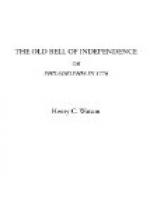“He was a dear, good man,” remarked Mrs. Harmar.
“Yes,” said old Harmar, “General Washington was the main pillar of the Revolution. As a general, he was vigilant and skilful; but if he had not been anything more, we might have been defeated and crushed by the enemy. He had the love and confidence of the men, on account of his character as a man, and that enabled him to remain firm and full of hope when his countrymen saw nothing but a gloomy prospect.”
THE SPY’S FATE
“Now I’ll tell you a story that I have just called to mind,” said old Harmar. “It’s of a very different character, though, from the story of Washington. It’s about a spy’s fate.”
“Where was the scene of it?” inquired Mrs. Harmar.
“Out here on the Schuylkill’s banks, just after the British took possession of this city,” replied old Harmar. “There was a man named James Sykes, who had a lime-kiln on the east bank of the river, and was manufacturing lime pretty extensively when the enemy came to this city. While Congress was sitting here, Sykes always professed to be a warm friend to the colonial cause; but there was always something suspicious about his movements, and his friends and neighbours did not put much faith in his professions. He would occasionally be out very late at night, and sometimes be gone from home for a week, and give very vague accounts of the business which had occupied him during his absence. Some of his neighbours suspected that he was acting as one of Sir William Howe’s spies, but they could never get any positive proof of their suspicions.
“At length the enemy took possession of this city, and then Sykes began to show that he was not such a very warm friend of the right side. He went to the head-quarters of the British general frequently, and seemed to be on the best terms with the enemy. Well, it happened that one of his old neighbors, named Jones, was the captain of one of the companies of our line; and he, somehow or other, obtained proof that Sykes was acting as a spy for the enemy. He informed General Wayne of the fact, and immediately proposed that he should be allowed to attempt his capture. Wayne consented, and Captain Jones set about preparing for the enterprise. Sykes was usually out at his lime-kiln, with some of his men, during the morning, and, as the guilty are ever suspicious, he increased the number of his assistants, to ensure himself against attack. Captain Jones took only twenty men from his company, and left our camp just before dark. The business was full of danger. The place where Jones expected to capture the spy was within a mile of a British out-post; and the greatest secrecy and rapidity of movement was necessary to prevent surprise by the enemy’s scouting parties.




